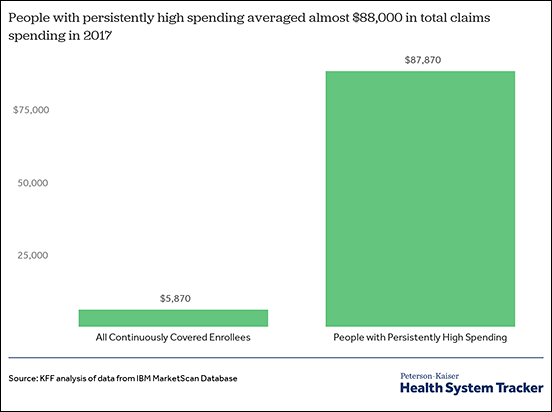
The independent source for health policy research, polling, and news.
Among People with Employer Coverage, Those with Persistently High Spending for Several Years Averaged Almost $88,000 in Health Spending in 2017
Prescription Drugs Accounted for almost 40 Percent of Costs for People with Persistently High Spending
Among people with three consecutive years of coverage from a large employer, just 1.3 percent of enrollees accounted for 19.5 percent of overall health spending in 2017, finds a new KFF analysis. These “people with persistently high spending” – people in the top five percent of spending in each of the three years from 2015 to 2017 – had average health spending of $87,870 in 2017. That compared to average per person spending of $5,870 among all large group enrollees during that period.
Spending on retail prescription drugs accounted for almost 40 percent of spending for those with persistently high spending in 2017, more than twice the percentage for enrollees overall. People with persistently high spending averaged over $34,100 in spending on retail prescription drugs (not including rebates) in 2017, compared to $1,290 for enrollees overall, the analysis finds. This underscores the importance of prescription drugs in treating people with chronic illnesses as well as the fact that some drugs have very high prices.
The analysis also finds a close association between having persistently high spending and being diagnosed with certain chronic health conditions such as HIV, multiple sclerosis, cystic fibrosis, rheumatoid arthritis, diabetes with complications, and a number of cancers. While not everyone with these conditions has persistently high spending, there are large shares of people with persistently high spending who have these diseases.
Overall, health spending is highly concentrated: a small share of people account for most health care spending in any year. This group changes from year to year as some people experience serious illness and recover, but a portion of the group continues to have high spending for longer periods. Their extensive health needs and predictably high spending make them an important focus for any efforts to lower costs and improve quality.
